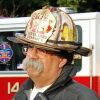There are very few things I am expertly qualified to provide opinions on. Single-family dwelling fires. Maybe. Firefighter survival. Perhaps. Spoiling grandchildren. Indubitably. (I have waited years to use that word. Finally.)
But rest assured, the coronavirus is way outta my league professionally.
As a citizen quickly approaching age 65, I’m not obsessed – but admittedly am a little nervous – but thankfully my wife, Teri, who also serves as my prison warden, has made it clear what I can and cannot do, and what I can and cannot leave the house for, with mask on face, protecting me, my mustache and I.
In reflecting on what’s been going on for the past two months, and now seeing the number of firefighter and EMS provider deaths approaching 50 (according to the National Fallen Firefighters Foundation), it certainly gives pause for thought. And that’s the problem – I think I’m going a little nuts thinking about all that is going on. Admittedly, I am a news hound but have now limited my intake to the local evening news as well as some time with Lester Holt a few evenings a week.
Understanding expertise
I guess among the many things that stick in my mind, in addition to my family and friends, is the role we as fire officers have played for years.
For YEARS we have warned the public about stuff that can hurt or kill them:
- Don’t overload power cords.
- Don’t play with matches.
- Sleep with doors closed.
- Don’t deep fry turkeys on your wooden deck.
- Don’t leave candles unattended.
- Keep space heaters away from anything.
- Safely store flammable liquids.
- Check smoke alarms.
- Consider residential fire sprinklers.
If you and I each got a dollar for every time we shared one of these messages, we’d all be financially better off than we currently are.
After all, WE are the experts. We tell them, and if they listen, they do well. But so many don’t listen – and that’s why we go to fires.
There are also runs we respond to where we are not experts. For example, we have a regional hazmat team that responds to help because we are not the experts. Sure, we’re pretty good at getting there and not making it worse. But can we make it go away? Nope, not without the experts.
High-angle rescue? Same thing. We call in the rope-slinging carabiner corps with RESCUE written on the back of their pith helmets who know just what to do. They are more qualified than we are.
We do what we are experts in, and when we aren’t the experts, then we call in the true experts.
Of course, we have all seen fire departments operate at incidents and fail (sometimes tragically) because they were unable to size-up the problem and identify the proper solution. Their pride or whatever got in the way of calling in the crews that quite frankly may be more qualified than them.
I learned a long time ago – and my actions as a boss for decades have backed it up – that the moment there is a hint that we may not be able to solve the problem, we bring in more or call in the experts and let them advise us on solving the problem. Whose problem? The people having the emergency. It’s actually not our problem; it is their problem, and they called 911 asking us to fix their problem, resulting in a better day.
Knowing when you are qualified to solve a problem and when you need additional qualified resources is probably written in some leadership book, somewhere. But wherever it is, it makes sense.
And that brings us to today …
The world, and specifically North America, is going through a very, very difficult time with the virus and, as of this writing, the numbers of those infected and dying continue to grow each and every day. And on top of that is the economic devastation caused by the pandemic.
I have a very close friend who was once a firefighter with me in the 70s. He is now arguably one of the top, if not THE top, physicians and medical leaders in the world, specifically in the area of respiratory issues. He is affiliated with a hospital whose name every one of you would recognize. He is an expert in his field, I promise.
He and I speak quite a bit, and after our last discussion, I was left with the same feeling that firefighters and fire chiefs have when we warn the public – and when we warn the politicians – about the dangers of fire. We show the stats, we show the examples, we show the proof, and we show the prevention opportunities over and over and over. And while some listen, many don’t.
Some don’t listen because of cost. Some don’t listen because they don’t want us, their local government, to tell them what to do. And some don’t listen because they think it won’t happen to them. There is always an excuse. So we keep going to fires and the other emergencies – the same kind of incidents that we beg people to learn how to prevent.
If they had only listened to us, the experts, the ones who know. And that brings me right back to where we are today.




